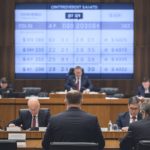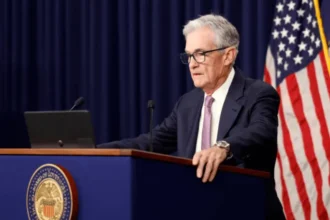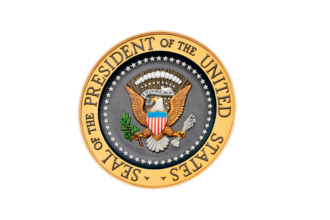Tech entrepreneurs imagine a world where citizenship is as flexible as a gym membership, and democracy could be left behind.
- Is Tech Disrupting Traditional Institutions by Design?
- Are Corporations Trying to Replace Governments?
- Are Charter Cities and Private Islands the First Steps to a Network State?
- Is the Vision of Cyber States a Dream or a Dangerous Fantasy?
- Is This the Birth of a New Kind of Radical Vision?
- Is This a Glimpse of the Future or a Tech Bro Fantasy?
Concerns over the direction democracy is headed as political volatility looms ahead of the US presidential contest. However, this is an opportunity rather than a warning for a group of digital entrepreneurs supported by Silicon Valley’s rich resources. These inventors see a radical future in which you pick your citizenship just like you would choose your gym membership. This is Balaji Srinivasan, a superstar in the crypto space sometimes known just as “Balaji,” and he has an aspirational goal. Balaji, a serial tech entrepreneur and venture capitalist, thinks that software can solve problems any government can.
The Future of US National Security: The Golden Dome Missile Defense System Explained
“Ideas like the nation-state are outdated,” Balaji said in Amsterdam last September at a conference. Standing on stage in a baggy gray suit and loose tie, he appeared more like a business middle management than a digital genius. Still, his message was not that typical. “We launch fledgling businesses like Google. Like Facebook, we create fresh communities. We introduce fresh currencies like Ethereum and Bitcoin. Is it possible to create new nations?
Balaji’s idea is based on this, what he refers to as the “network state,” which sees a time when startup countries coexist with established ones until they are replaced.
Is Tech Disrupting Traditional Institutions by Design?
Silicon Valley is long known for its passion for “disruption.” Tech companies have transformed established businesses for years, from media and education to banking and space flight. They now fix their eyes on the government itself. “Imagine a thousand different startups, each of which replaces a different legacy institution,” Balaji told the Amsterdam audience. “They live alongside the establishment in parallel, dragging away consumers, gaining strength until they become the new thing.”
Why not nations, too, if startups might replace institutions? Balaji’s theory is straightforward: first formed on the internet, groups would start constrained by common ideals or interests. These societies would ultimately buy land and transform into actual entities or “countries” with their laws, coexisting with and finally replacing conventional nation-states. “You would select your nationality as your broadband provider,” Balaji said.
Are Corporations Trying to Replace Governments?
Nothing new about the way companies shape governments. The phrase “banana republic” itself comes from United Fruit’s 1930s supremacy over Guatemala when the business essentially ruled over that nation. The CIA helped plan a coup as the Guatemalan government sought to recover some authority. However, the goals of the network state movement are beyond corporate control; they see corporate-run societies substituting for governments.
Critics contend this is a neo-colonial initiative whereby corporate tyrants serving shareholders will replace elected authorities. Advocates see it as a means of escaping what they consider as Western democracies’ oppressive bureaucracy. Parts of this vision are beginning to take form already. Highlights of the Amsterdam conference included presentations of “startup societies” like Culdesac, an Arizona remote work community, and Cabin, a network city with branches in the US and Portugal.
Are Charter Cities and Private Islands the First Steps to a Network State?
Balaji’s “network state” theory develops on “charter cities,” which are metropolitan regions serving as open markets like free ports. Projects like these are already in development globally in Nigeria and Zambia. Promising at a recent Las Vegas rally to construct “special new zones with ultra-low taxes and ultra-low regulation” on federal property in Nevada to draw new businesses and develop affordable homes, even Donald Trump has indicated an interest in this plan.
One of the most remarkable instances of a “network state” in operation is Próspera, a private city on an island off Honduras’s coast. Under a former Honduran administration, Próspera, run by a for-profit firm with Delaware headquarters, was given special status to develop its laws. Xiomara Castro, the present president, wanted it gone and started depriving the city of rights. Today, Próspera is suing the Honduran government for $10.8 billion.
Is the Vision of Cyber States a Dream or a Dangerous Fantasy?
Although there were many aspirational presentations during the Amsterdam conference, few were as bold as Dryden Brown’s. Wearing a gray sweatshirt, he stepped on stage to suggest creating a new city-state run under blockchain technology instead of bureaucracy on the Mediterranean coast. Referring to his project, Praxis, he remarked, “Its founding principles would be ideas of ‘vitality’ and ‘heroic virtue,'” Still, specifics were few: just where would this metropolis be constructed? Who would build the infrastructure? And with whom would one manage it?
Praxis now largely exists online, with a page allowing one to apply for “citizenship.” Still, it has a reputation for its edgy, elite events, frequented by hipster models, computer programmers, and Dark Enlightenment characters like Curtis Yarvin, who supports a society governed by corporate “monarchs.” Some have called such notions fascist, a charge Yarvin disputes.
Is This the Birth of a New Kind of Radical Vision?
An invitation for a Praxis event in Manhattan arrived months after the Amsterdam conference. Held at the venerable Ella Funt nightclub, the celebration was an odd mix of crypto enthusiasts and modelesque celebrities. Around the bar, copies of the Praxis magazine were arranged with adverts for goods as different as 3D-printed firearms and perfume. One advertisement just used “milk,” a symbol with white nationalist overtones in certain internet forums.
Readers of the magazine were urged to “photocopy pages and paste them around your town.” Though not for the magazine, a Xerox machine had been set up in the club, and people were busy utilizing it. Rather, they were photocopying elements of their bodies.
A young man identifying himself as Zac, a “crypto cowboy” from Milton Keynes, struck up a discussion among the tumult. Saying he felt as though they were at a new frontier, he stated, “I kind of represent the American Wild West.” Others, like a guy identifying himself as Azi Mandias, an allusion to the Percy Bysshe Shelley poem “Ozymandias,” thought that emerging technologies like encryption and artificial intelligence would hasten the fall of the democratic nation-state.
“Democracy is fantastic,” Azi added. Still, a moral tyrant is the ideal ruler. Certain people refer to [that] the philosopher king. Though he looked enthralled by the idea, he expected the change to what he termed the “network state” to be violent and Darwinistic to be brutal. “We live on the brink of the next renaissance.”
Is This a Glimpse of the Future or a Tech Bro Fantasy?
A visit to the “Praxis Embassy” the next day turned up a loft area loaded with literature, including Nietzsche’s writings, histories of Napoleon, and a copy of The Dictator’s Handbook. The encounter begged one to speculate what had happened the evening before.
Is this the future—one in which conventional nations vanish into a web of corporate-run “network states” and in which citizenship is as flexible as shifting your phone plan? Alternatively, are these tech bros staging a complex show with alt-right undertones to ridicule the establishment, acting out dress-up?
Whichever the response, the drive towards additional autonomous zones, free ports, and charter cities is gathering steam. And the network state movement is primed to intervene should democracy face challenges.
Ultimately, the issue still stands: will these network nations represent the utopian answer their creators see or a dystopian nightmare of corporate control? The future of government could be more disruptive and controversial than ever if Balaji and his Silicon Valley supporters keep stretching the envelope.







